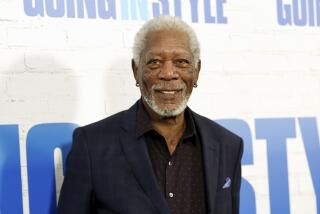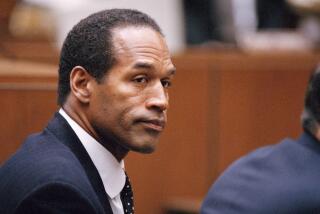Racism Remains Pervasive in America
In the July 7 Sunday Calendar cover story (“Life [Regular], Career [Premium]”), Patrick Goldstein quoted Denzel Washington: “It’s a racist society. Everything in this country is about color. . . . And if it’s not a level playing field in America, it’s certainly not in Hollywood.”
The next week, a letter attacked Washington for “glibly” pontificating about racism. But the same issue carried a profile of Andre Braugher (star of TV’s “Homicide: Life on the Street”), who amplifies Washington’s charge:
“I’m black in America. On a daily basis, I’m reminded that I’m unwanted. It’s just a fact of life. I was born without civil rights and I grew up angry. I’m not protected by my family or wealth or intelligence from the daily assaults that are inflicted on the dignity of black Americans everywhere in this country.”
While Calendar hasn’t published any letters attacking Braugher for pontificating, the sentiment is surely out there. And meanwhile--for the rest of us who aren’t successful dramatic stars--racism continues to be just as pervasive.
Earlier this spring, an organization in Boston called Skills for Life distributed a questionnaire to 271 successful white and African American professionals--lawyers, doctors, business executives--from across the country. Skills for Life goes into college athletic programs and talks to young men and women about the real “skills for life” they will need--teamwork, networking, etc.--when their athletic careers are over.
The questionnaire was meant to support the Skills for Life program by finding out what these professionals thought were the keys to their success, where they learned them, other courses/curriculum they wished they’d taken in college, etc.
The results are perhaps predictable: Most of the 124 respondents stressed the overall importance of personal character, the critical need for communication skills in the business world and the interpersonal skills (both teamwork and leadership) that the workplace demands.
On only one question of the eight-part questionnaire, in fact, did the white and black respondents vehemently disagree: “In your business experience, what are the greatest difficulties/obstacles you have encountered?”
The white responses described a whole range of problems, discovered both within (“time management”) and outside (“bureaucracy”) themselves. Their responses detailed the “politics of the workplace” and “day-to-day frustration,” and provided a number of insights about the workplace--e.g., “understanding that compatibility is as important as competence” and “trying to understand egos and finding a management style that fits your own.”
The white responses, in short, cataloged all the problems entailed in both leadership and teamwork; only two referred to discrimination of any kind, one to “age bias” and the other to “class and social barriers.”
*
But, on the African American side, nearly every response contained the charge of racism. While there were insights into other obstacles as well (e.g., “maintaining focus . . . and not allowing the distraction of immediate and/or short-term satisfactions at the expense of larger, more important goals”), the bulk of the responses were about prejudice and discrimination.
Typical difficulties these respondents perceived: “being accepted as an equal in both knowledge and skills,” “the traditional stereotypes of not being as intelligent/competent,” “prejudice from whites,” “institutionalized racism.”
The white and African American respondents listed the same skills important to their professional or business success (character, communication and social competence), but when asked not just to rank these issues, but to talk about them in some detail, then the differences appeared.
Blacks viewed themselves as “being tested constantly and needing to prove [themselves] over and over.” Whites got beyond any initial difficulties to talk about the real problems in the workplace or within themselves; the African American sample viewed itself as stuck at the starting gate, handicapped even before it got into the race. As one respondent eloquently wrote, the greatest difficulty was:
“The fact that no matter what I accomplish professionally/
personally, I will always be viewed as a ‘black man.’ This constant struggle for ‘acceptance’ into America’s mainstream places a strain on you emotionally, and I believe ultimately affects your performance.”
The greatest obstacle for African Americans, these businessmen wrote, was the fact that they were African American.
When Denzel Washington and Andre Braugher start talking about racism, then, they are not lonely voices in the wilderness, because their words are echoed again and again by other successful African Americans. Calendar is just overhearing a conversation that African Americans have been having for some years. It is perhaps time that the rest of America began to listen to it as well.
More to Read
The complete guide to home viewing
Get Screen Gab for everything about the TV shows and streaming movies everyone’s talking about.
You may occasionally receive promotional content from the Los Angeles Times.






